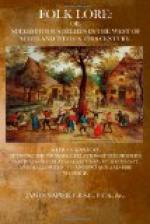“The bairnie she swyl’d
in linen so fine,
In a gilded casket she laid
it syne,
Mickle saut and light she
laid therein,
Cause yet in God’s house
it had’na been.”
Let us return to the mother and child whom we left visiting at a friend’s house, and receiving the covenant of friendship. It was unsafe to be lavish in praise of the child’s beauty, for although such commendation would naturally be gratifying to the mother, it would at the same time increase her fears, for the well faured ran the greatest risk from evil influences, and of being carried off by the fairies. There was also the superadded danger of the mother setting her affections too much upon her child and forgetting God, who then in jealousy and mercy would remove it from her. This latter was a very widespread superstition among religiously-minded people, even among those who, from their education, ought to have known better. I well remember the case of a young mother,—a tender loving woman, who, quite in keeping with her excitable affectionate nature, was passionately fond of her baby, her first-born. But baby sickened and died, and the poor mother, borne down with grief, wept bitterly, like Rachel refusing to be comforted. In the depth of her affliction she was visited by both her pastor and elder. They admonished her to turn her mind from the selfish sorrow in which she was indulging, and thank God for His kindly dealing toward her, in that He had removed from her the cause of sin on her part. She had been guilty, they said, of loving the baby too much, and God, who was a jealous God, would not suffer His people to set their affections on any object in a greater degree than on Himself; and therefore, He, in his mercy toward her, had removed from her the object of her idolatry. The poor woman in her agony could only sob out, “Surely it was no sin to love my own child that God gave me.” The more correct term for such a theological conception would not be superstition, but blasphemy.




